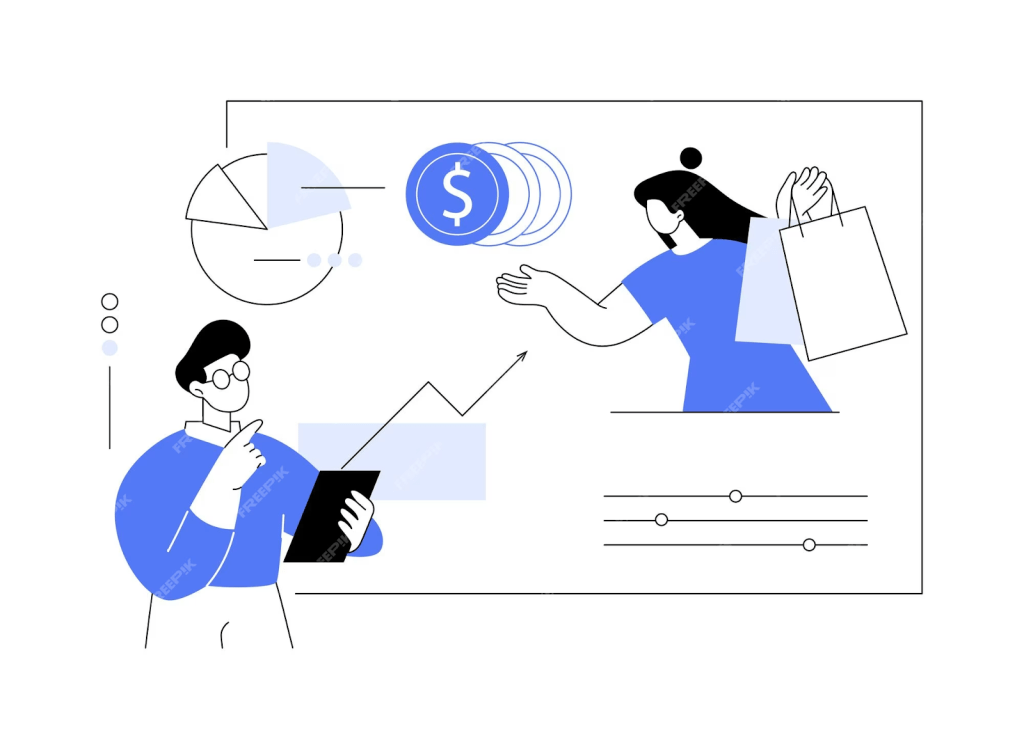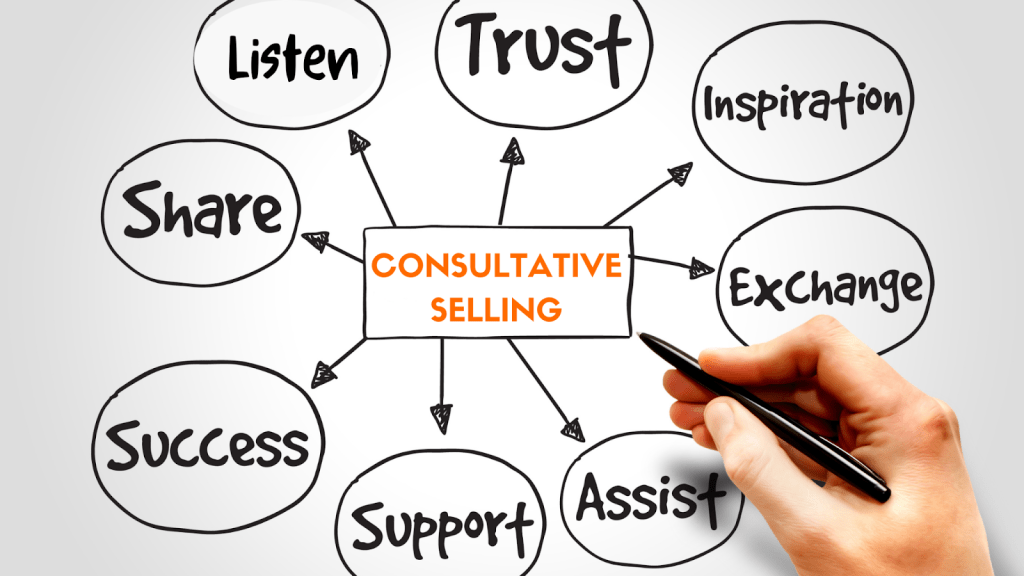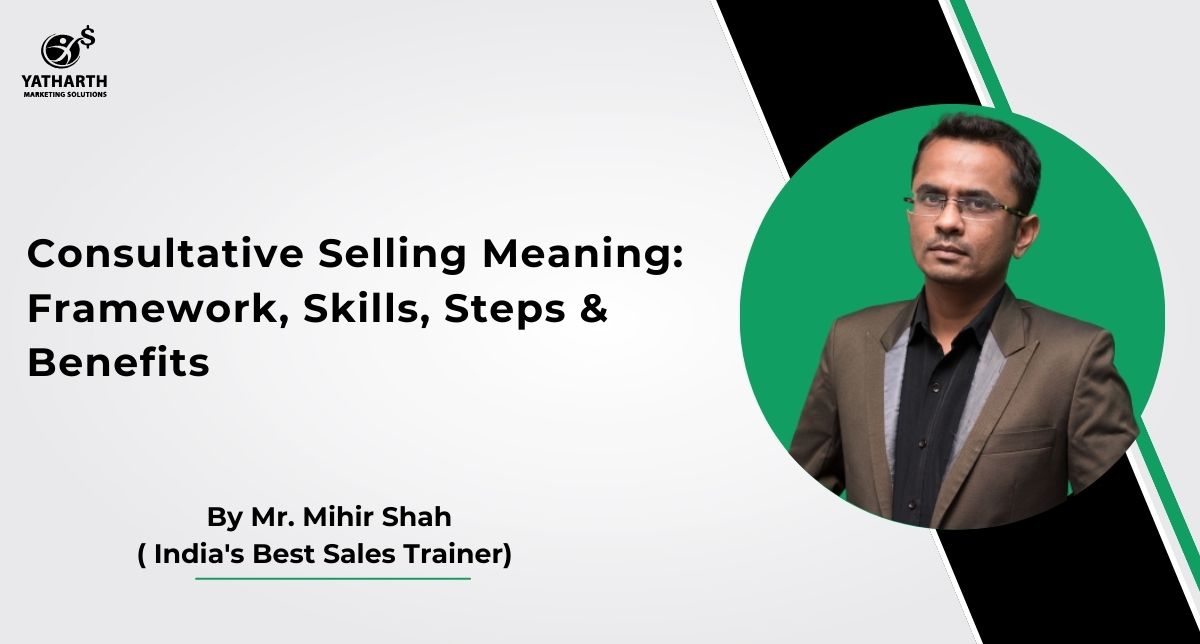In the ever-evolving landscape of sales and marketing, one approach that has stood the test of time and continues to drive success is consultative selling.
This customer-centric approach is all about understanding your clients’ needs deeply, providing tailored solutions, and building strong, long-term relationships.
In this blog post, we will delve into the consultative selling meaning, explore its framework, discuss the essential skills needed, outline the steps involved, and highlight its numerous advantages.
Let’s Start!!
Explain Consultative Selling Meaning
Consultative selling is a sales methodology that prioritizes a deep understanding of the customer’s needs and challenges.
Instead of bombarding potential clients with generic pitches, consultative selling focuses on building a relationship based on trust, expertise, and empathy.

Consultative Selling technique is a trusted and verified sales methodology adopted by many salespeople around the globe.
It’s about becoming a trusted advisor to your clients and guiding them toward the best solutions for their unique problems.
It says, salespeople have to prioritize their relationship with customers, instead of worrying about selling products.
But do you know how long salespersons have been using this consultative selling approach? It was longer than you might think!!!
This Consultative selling method was first floated as a sales technique during the 1970s in Mack Hanan’s book “Consultative Selling: The Hanan Formula for High-Margin Sales at High Levels” and then it was adopted by sales professionals of various industries.
Reps had a hard time seeing the importance of making an attempt to form enduring relationships with clients. As a result, the strategy was obscured by aggressive sales techniques.
However, consultative selling makes sense when you stand back. It aids salespeople in quickly qualifying prospects while also adjusting a product solution to fit their unique requirements. not to mention lowering long-term consumer attrition.
Why Consultative Selling Works?
There are hardly enough words to convey how important connections are to sales. Therefore, it makes logical sense to use a sales strategy that prioritizes building a trustworthy rapport with your clients over generating quick revenue.
The startling truth is that B2B clients are losing interest in their businesses. Customers are proving to be more sceptical of the information salespeople provide, according to a Gartner survey.

The result of this lack of trust is low consumer confidence. Sales representatives need to improve how their clients view them in order to overcome this, which comes down to the question, “Do my customers ever trust me that I’m trying to provide (sell) them something that will actually be useful to resolve their problems?”
The ability to engage in “value-added selling” is another benefit of consultative selling. The customer’s needs will be better understood by a sales representative who approaches prospects with a consultative selling mindset as opposed to one who employs the more conventional sales strategy of going for the hard sell.
In other words, consultative selling rewards client connections, so the effort you and your sales team invest in it will pay off in the long term.
Although some of that task can be automated by using customer relationship management (CRM) software, you still need to incorporate the idea of quality connections into your sales strategy and sales training on your own.
Let’s see what are the principles on which actually Consultative Selling works.
Consultative Selling Principles
The principles of consultative selling are designed to build strong, long-term customer relationships and ultimately drive sales success.

Here are the key principles of consultative selling:
Customer-Centric Approach
Consultative selling starts with a genuine commitment to understanding the customer’s unique needs, challenges, and goals. It’s about putting the customer’s interests first.
Active Listening
Effective listening is crucial in consultative selling. Sales professionals must actively listen to the customer to uncover their pain points, desires, and priorities.
This involves asking open-ended questions and allowing the customer to speak without interruption.
Customized Solutions
Rather than pushing a one-size-fits-all product or service, consultative selling involves tailoring solutions to meet the specific needs and preferences of the customer. This may involve recommending different options or configurations.
Education and Information Sharing
Sales professionals should act as educators, providing valuable information and insights to help the customer make informed decisions. This positions you as a trusted advisor.
Problem Solving
Consultative selling is about solving the customer’s problems or addressing their pain points.
Salespeople should focus on how their offerings can provide solutions and bring tangible benefits.
Effective Communication
Clear and effective communication is essential in consultative selling. It’s not only about what you say but how you say it. Tailor your communication style to match the customer’s preferences.
Objection Handling
Anticipate and address objections that the customer may have. View objections as opportunities to further understand the customer’s concerns and provide relevant solutions.
Closing with Confidence
While consultative selling is customer-centric, it still involves closing the deal. When the time is right, confidently ask for the sale, ensuring that the proposed solution aligns with the customer’s needs and desires.
By following these consultative selling principles, sales professionals can establish themselves as trusted advisors and build lasting, mutually beneficial relationships with their customers, ultimately leading to increased sales and customer satisfaction.
Want to know about Consultative Selling Framework in detail? Then read the following section.
Framework of Consultative Selling
Consultative selling follows a structured framework that guides sales professionals through the process of understanding and addressing customer needs.
The framework typically includes the following stages:
Stage 1: Research
Begin by thoroughly researching your prospect’s industry, company, and specific pain points. The more you know, the better you can tailor your approach.
Stage 2: Build Rapport
Establish a genuine connection with your prospect. Show interest in their business and challenges, and listen actively to what they have to say.
Stage 3: Identify Needs
Ask open-ended questions to uncover their specific needs and pain points. Encourage them to share their goals and objectives.
Stage 4: Present Solutions
Based on your understanding of their needs, present solutions that are customized to address their unique challenges. Highlight the benefits and value of your offerings.
Stage 5: Handle Objections
Be prepared to address any objections or concerns they may have. Use your expertise to overcome objections and reassure them that your solution is the right choice.
Stage 6: Close the Sale
Once you’ve addressed their concerns and demonstrated how your solution can solve their problems, ask for the sale.
Stage 7: Follow-up
After the sale, continue to provide support and value to your client. This builds trust and can lead to long-term relationships and repeat business.
Consultative Selling vs. NEAT Selling
Certainly, here’s a comparison of Consultative Selling and NEAT Selling in tabular form:
| Aspect | Consultative Selling | NEAT Selling |
| Approach | Customer-centric approach, focusing on understanding customer needs and providing tailored solutions. | Data-driven approach, using analytics and technology to identify and engage with prospects. |
| Focus | Relationship-driven, emphasizing trust and rapport with customers. | Data-driven, with a focus on efficiency and scalability. |
| Sales Process | Involves a series of open-ended questions, active listening, and in-depth discussions with the customer. | Relies on automation, algorithms, and predictive analytics to identify potential leads and engage them. |
| Personalization | Highly personalized approach, tailoring solutions to individual customer needs. | Uses data to segment and target prospects, but may have less personalization in initial outreach. |
| Time-Consuming | Can be time-consuming due to the need for in-depth conversations and relationship-building. | Generally more time-efficient, as it relies on technology to identify and engage prospects. |
| Relationship Building | Strong emphasis on building long-term relationships with customers. | Focuses on quick engagement and conversions. |
| Human Interaction | Relies heavily on human interaction and interpersonal skills. | Combines human interaction with technology-driven prospecting and engagement. |
| Industry Applicability | Widely applicable across industries, especially for complex and high-value sales. | Particularly suitable for industries with a large volume of potential leads, such as e-commerce. |
| Sales Cycle | Typically longer sales cycles due to the emphasis on understanding customer needs and building trust. | Can result in shorter sales cycles, especially for low-complexity products or services. |
| Adaptability | Flexible and adaptable to various customer needs and situations. | May not be as adaptable to complex, high-touch sales scenarios. |
Both Consultative Selling and NEAT Selling have their advantages and are suitable for different sales situations.
Consultative Selling is more relationship-focused and effective for high-value, complex sales, while NEAT Selling is data-driven and efficient, making it ideal for industries with a large volume of potential leads.
Now, we will discuss what skills are required to implement consultative selling.
Top 5 Skills Required for Consultative Selling
To excel in consultative selling, sales professionals need a diverse set of skills, including:
1. Effective Communication
The ability to listen actively and communicate clearly is essential in understanding customer needs and conveying solutions.
2. Empathy
Understanding and empathizing with the client’s challenges helps build trust and rapport.
3. Product Knowledge
A deep understanding of your products or services is crucial to tailor solutions effectively.
4. Problem-Solving
Salespeople should be adept at analyzing complex problems and providing creative solutions.
5. Relationship Building
Building strong, long-lasting relationships with clients is at the core of consultative selling.
Let’s explore the main benefits of using consultative selling while selling.
Advantages of Consultative Selling
Here, we have listed the effective benefits of consultative selling! Have a look:
Builds Trust
By demonstrating expertise and empathy, consultative selling builds trust with clients.
Long-Term Relationships
It fosters long-term client relationships, leading to repeat business and referrals.
Higher Conversion Rates
Understanding client needs improves the chances of closing deals.
Customer-Centric
It puts the customer’s needs at the forefront, aligning your offerings with their goals.
Differentiation
Consultative selling sets you apart from competitors who use traditional, less customer-focused methods.
Quick-Steps Summary in Consultative Selling
- Research and Preparation: Gather information about the prospect and their industry.
- Approach and Introduction: Initiate contact and establish a positive first impression.
- Discovery and Needs Analysis: Ask probing questions to understand their needs.
- Presentation and Solution: Tailor your pitch to address their specific challenges.
- Objection Handling: Address objections with empathy and expertise.
- Closing the Sale: Ask for the sale when the time is right.
- Follow-up and Relationship Building: Continue to provide support and value after the sale.
Conclusion
In conclusion, consultative selling is a powerful approach that encompasses a well-defined framework, essential skills, and a structured set of steps designed to foster meaningful client relationships while achieving sales objectives.
Through the process of consultative selling, sales professionals not only identify the unique needs and challenges of their clients but also position themselves as trusted advisors who can provide tailored solutions.
Sales training plays a pivotal role in equipping sales teams with the knowledge and expertise needed to excel in consultative selling.
By imparting the necessary skills, such as active listening, empathy, and problem-solving, sales training empowers individuals to adapt to the dynamic nature of modern sales environments.
Furthermore, it helps teams stay up-to-date with evolving industry trends and customer expectations.
In a world where relationships and trust are paramount in the sales process, consultative selling, supported by ongoing sales training, is a key driver of success, enabling businesses to not only meet but exceed customer expectations while achieving their sales goals.
It is a testament to the power of customer-centricity and the value of continuous learning and improvement in the realm of sales.
Frequently Asked Questions (FAQs)
What skills are crucial for success in consultative selling?
Key skills for consultative selling include effective communication, empathy, in-depth product knowledge, problem-solving ability, and relationship-building skills. These skills enable salespeople to connect with clients, understand their needs, and offer relevant solutions.
How can consultative selling help in handling objections from potential clients?
Consultative selling equips sales professionals with the knowledge and empathy to address objections effectively. By understanding the client's concerns and demonstrating how the solution aligns with their needs, objections can often be overcome.
Can consultative selling be applied to all industries and types of products or services?
Yes, consultative selling can be adapted to various industries and types of products or services. It's particularly effective in industries where the client's needs are complex and require tailored solutions.
How can a sales team or individual salesperson transition from traditional sales methods to consultative selling?
Transitioning to consultative selling involves training and developing the necessary skills, adopting a customer-centric mindset, and implementing the consultative selling framework in daily sales activities. It may also require a shift in sales culture and practices within an organization.
What role does empathy play in consultative selling, and why is it important?
Empathy is crucial in consultative selling as it enables sales professionals to genuinely understand and relate to the client's challenges and needs. It builds trust and helps establish a strong rapport, which is essential for successful consultative selling.
Can consultative selling be used in combination with other sales methodologies?
Yes, consultative selling can be used in combination with other sales methodologies when appropriate. It's a flexible approach that can complement other methods to enhance overall sales effectiveness, depending on the situation and the client's needs.
What is the framework of consultative selling, and why is it important?
The framework of consultative selling involves stages like research, building rapport, identifying needs, presenting solutions, handling objections, closing the sale, and follow-up. It's essential because it provides a structured approach to guide sales professionals in understanding and addressing customer needs effectively.
